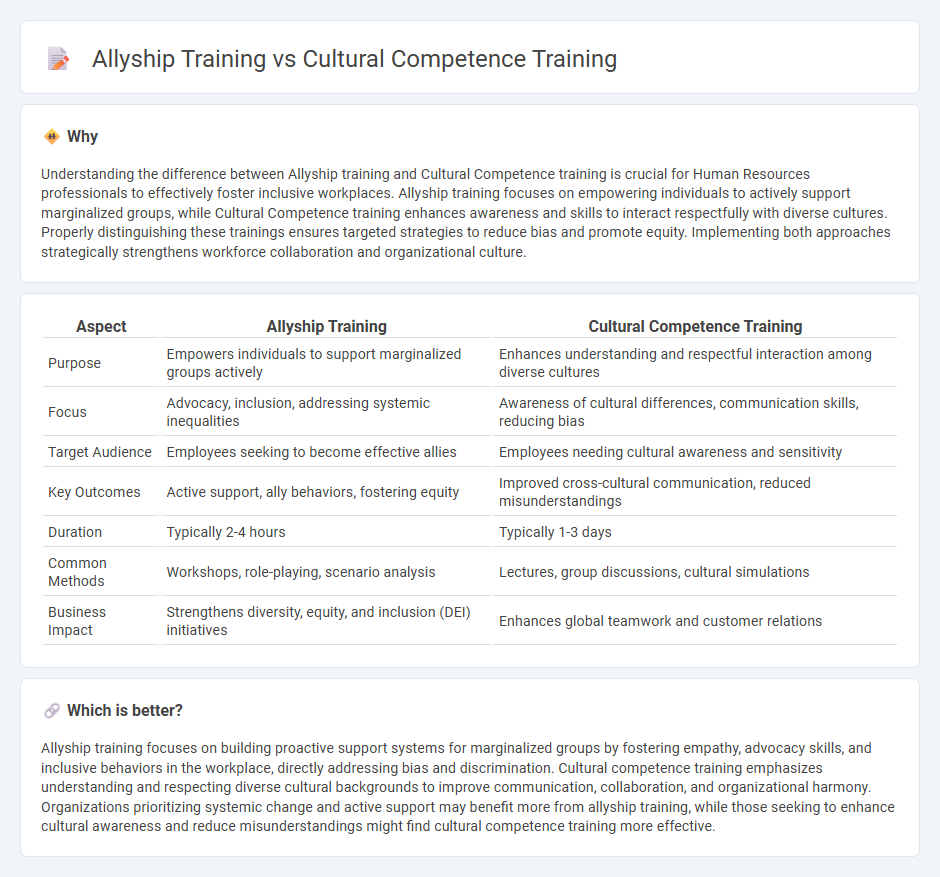
Allyship training equips employees with skills to actively support marginalized groups through advocacy and solidarity, fostering inclusive workplace cultures. Cultural competence training enhances understanding and appreciation of diverse cultural backgrounds to improve communication and collaboration. Discover how each approach can transform your organization's diversity and inclusion efforts.
Why it is important
Understanding the difference between Allyship training and Cultural Competence training is crucial for Human Resources professionals to effectively foster inclusive workplaces. Allyship training focuses on empowering individuals to actively support marginalized groups, while Cultural Competence training enhances awareness and skills to interact respectfully with diverse cultures. Properly distinguishing these trainings ensures targeted strategies to reduce bias and promote equity. Implementing both approaches strategically strengthens workforce collaboration and organizational culture.
Comparison Table
| Aspect | Allyship Training | Cultural Competence Training |
|---|---|---|
| Purpose | Empowers individuals to support marginalized groups actively | Enhances understanding and respectful interaction among diverse cultures |
| Focus | Advocacy, inclusion, addressing systemic inequalities | Awareness of cultural differences, communication skills, reducing bias |
| Target Audience | Employees seeking to become effective allies | Employees needing cultural awareness and sensitivity |
| Key Outcomes | Active support, ally behaviors, fostering equity | Improved cross-cultural communication, reduced misunderstandings |
| Duration | Typically 2-4 hours | Typically 1-3 days |
| Common Methods | Workshops, role-playing, scenario analysis | Lectures, group discussions, cultural simulations |
| Business Impact | Strengthens diversity, equity, and inclusion (DEI) initiatives | Enhances global teamwork and customer relations |
Which is better?
Allyship training focuses on building proactive support systems for marginalized groups by fostering empathy, advocacy skills, and inclusive behaviors in the workplace, directly addressing bias and discrimination. Cultural competence training emphasizes understanding and respecting diverse cultural backgrounds to improve communication, collaboration, and organizational harmony. Organizations prioritizing systemic change and active support may benefit more from allyship training, while those seeking to enhance cultural awareness and reduce misunderstandings might find cultural competence training more effective.
Connection
Allyship training and cultural competence training both enhance workplace inclusivity by fostering understanding and respect for diverse backgrounds. Allyship training empowers employees to actively support marginalized groups, while cultural competence training develops the skills needed to effectively interact with individuals from various cultures. Together, they create a more equitable and collaborative organizational environment.
Key Terms
Diversity
Cultural competence training deepens understanding of diverse cultural backgrounds, helping individuals communicate and interact effectively across different communities, while allyship training emphasizes active support and advocacy for marginalized groups to foster inclusion and equity. Diversity-focused cultural competence strengthens organizational cohesion by cultivating respect for cultural differences, whereas allyship training drives behavioral change through empowerment and solidarity. Explore more about enhancing diversity through targeted training programs to build inclusive environments.
Inclusion
Cultural competence training enhances understanding of diverse cultural backgrounds and fosters respectful interactions in workplaces and communities. Allyship training emphasizes active support and advocacy for marginalized groups, promoting deeper inclusion and social equity. Explore the distinct approaches of these trainings to effectively build inclusive environments.
Advocacy
Cultural competence training enhances understanding and respect for diverse cultural backgrounds, promoting effective communication and inclusivity. Allyship training centers on active advocacy, empowering individuals to support marginalized groups through intentional actions and challenging systemic inequalities. Discover how combining both approaches can strengthen advocacy efforts in your organization.
Source and External Links
What Is Cultural Competency Training? | Aspiring to Include - Cultural competency training is a structured program designed to enhance understanding and sensitivity toward diverse cultures, focusing on developing effective, respectful communication across cultural differences.
Cultural Competence [Course Preview] - Relias - This training fosters an understanding of and sensitivity to difference and diversity, aiming to build awareness and skills for interacting respectfully in multicultural environments.
Cultural Competency Training: 6 Keys - Diversity Resources - The training provides instruction on positive behaviors, attitudes, and policies that value diversity, understand cultural differences, and promote empathy and open-mindedness in the workplace.
 dowidth.com
dowidth.com